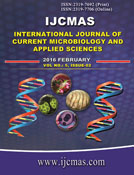


 National Academy of Agricultural Sciences (NAAS)
National Academy of Agricultural Sciences (NAAS)

|
PRINT ISSN : 2319-7692
Online ISSN : 2319-7706 Issues : 12 per year Publisher : Excellent Publishers Email : editorijcmas@gmail.com / submit@ijcmas.com Editor-in-chief: Dr.M.Prakash Index Copernicus ICV 2018: 95.39 NAAS RATING 2020: 5.38 |
Cleome gynandra (L.) Briq and Cleome viscosa (L.) Briq.,of the Capparaceae family are two wild or semi-domesticated herbaceous highly consumed as traditional leafy vegetables in Southern Benin. They are little studied and belong to the neglected and underutilized species. This study aims to assess the ethnobotanical knowledge and the qualitative phytochemical composition of these species as well as and their toxicity risk in southern Benin. Ethnobotanical data were collected using participatory appraisal tools and techniques such as group and individual surveys and field visits using questionnaires. The phytochemical screening was carried out using leaves powders of both species and standard methods based on colourand precipitation reactions. Collected data were analyzed with both descriptive statistics and multivariate (Principal Component Analysis- PCA)analysis using SAS V.9.2 software.PCA helped to examine the relationship between ethnic groups and usages of C. gynandra and C. viscosa. Results obtained, indicated that C. gynandra is more used for food (70% of responses) than C. viscosa which is more used for traditional medicine (45% of responses). Preferred habitat of both species are agglomerations, near households, home gardens and road sides. C. gynandra and C. viscosa are nutraceuticals and used can treat, through consumptions, malaria, icterus, anemia, fever, chronic malaria, eyes’ disorders, chronic constipation, hypotension and hypertension, ears aches and neuralgia. The study revealed that these two plant species would have medico-magic protection power. Mina, Adja and Holly ethnic groups use more C. gynandra for food than Fon, Sahoue and Cotafon ethnic groups. In the other hand, Goun, Adja and Nago ethnic groups use more C. viscosa in traditional medicine than Cotafon, Holly and Fon ethnic groups. The qualitative phytochemical screening carried out on C. gynandra and C. viscosa using leaves extracts, revealed the presence of tannins, flavonoids, anthocyanin, leuco-anthocyanin, steroids, mucilage, reducing compounds and quinone derivatives which varies according to the plant species. The LC50 of C. viscosa and C. gynandra noted were respectively 0.78 mg/ml and3.125mg/ml indicating non toxicity. The nutritional value of the two species should be determined and there domestication accelerated and promoted.
 |
 |
 |
 |
 |